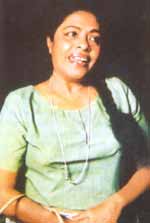| Plus |
|
|||
| Unforgettable From 'Kuveni' and 'Hunuwataye Kathawa' to 'Diriya Mawa', Manel's was a distinguished career on the stage. She had acting ability and a fine voice. She was a disciplined artiste. She had a busy schedule during the sixties playing lead roles in not less than seven of Henry's productions ranging from 'Kuveni' to 'Manaranjana Wedawarjana'. Several others followed. At times she had to change from one role to another almost every other day. She coped very well. Having played the role of Grusha, the palace kitchen maid in 'Hunuwataya' over 2500 times within a space of two decades she created a record. When Henry revived the play with a new cast recently, Manel stepped aside and got involved in the production in spite of her kidney ailment. On opening night, she sat with Henry in the second row at the Lionel Wendt and at the end of the show, she told me, "Now don't start comparing the new Grusha with the earlier one." I didn't. Manel
as Grusha was unmatchable. That's why the 'Vel palame geetaya' echoes
in our ears: During
these twenty years He
called her 'dadabbariya' in the short note in Sinhala. I watched her on the sets at Kitulgala during the filming of 'Sadol Kandulu', one of the few films that she acted in. Senator Reggie Perera was the director. Rienzie Wijeratne and I spent a day there to do a feature for the Observer Magazine Edition on the maiden attempt of this lovable Senator. In recent years she was in demand for teledramas and won the best actress award for one performance. Manel was a dutiful wife. She looked after Henry during his serious illness not long ago, with devotion and diligence. She was happy the way he came round. His recovery enabled him to look after her during the past few months. A loving mother, she showered her affection on their only son Sudaraka and later on the grand children. Naturally
the ups and downs in life would have affected her - yet she was
always friendly and cheerful. Her contribution to the performing
arts will be long remembered. We are fortunate that her voice will
be with us through 'Sath Siyak', the CD and audio cassette released
a few months back with cuts from Henry's dramas.
Together in theatre and life Having been brought up in a social and cultural environment that differed sharply from the Peradeniya School of the great Sarachchandra, Henry led a different force in the theatre of the day extending the stylisation of Sarachchandra and applying the technique to deal with contemporary issues. This came as a surprise to those critics who had argued about the limitations of the stylised mode. Although in this sense Henry may be regarded as complementing the efforts of Sarachchandra, in another sense one can view him as a truly independent and vital dynamic in the theatre of post-Maname. In addition, Henry was also an organizer and he took drama to the people in a way that Sarachchandra pre-Lalitha failed to do. In all this, Manel was Henry's mentor and inspiration. The two of them began drawing full houses in Colombo and the outstations. Henry wrote and produced 17 plays. I cannot think of another couple that influenced Sinhala theatre in the way that the Henry and Manel Jayasena duo did with such singleness of purpose. As in their lives, in theatre too they were inseparable. Only in ‘Makara’ did Manel not take the stage with Henry. Manel's performances in ‘Kuveni’ and ‘Hunuwataye’ were incredibly sensitive. Hers was one of the finest voices to be heard on the Sinhala stage and the way she captured the nuances in her adopted characters always drew our admiration. My wife, Malini, and I are happy that we were able to be with Manel during her last days in and out of hospital. We also savour the time when the couple stayed with us in Melbourne for a local performance of ‘Hunuwataye’. Even recently, they acknowledged that their Melbourne days were one of the most memorable in their lives. It became all too clear that her medical battle was lost and that she was living on borrowed time. Nevertheless, her spirit never gave way. ‘Diriya Mawa’ was a diriya katha to the very end. Manel Jayasena has earned her place in our nation's history. (The writer was Maname's original Potheguru. He retired in 1994 as Secretary, Ministry of Labour and Vocational Training and is now domiciled in Australia.) |
||||
Copyright © 2001 Wijeya Newspapers
Ltd. All rights reserved. |
 As
I paid my last respects to Manel Jayasena, my thoughts flashed back
to the early 1960s when we enjoyed her award-winning performance
in 'Kuveni' as the much-maligned female of all-time. Her singing
was equally good, the voice so melodious. I could vividly picture
how she sang -
As
I paid my last respects to Manel Jayasena, my thoughts flashed back
to the early 1960s when we enjoyed her award-winning performance
in 'Kuveni' as the much-maligned female of all-time. Her singing
was equally good, the voice so melodious. I could vividly picture
how she sang -